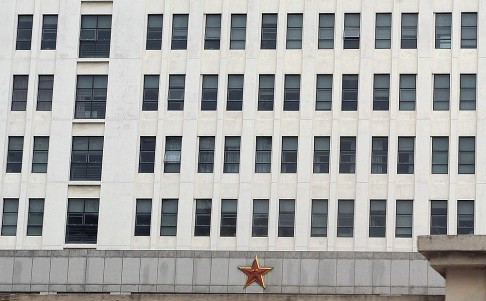US charges five members of China’s military with cyber-espionage
Report led by former US officials estimated last year that hacking was costing the US economy more than US$300 billion each year
PUBLISHED : Monday, 19 May, 2014, 10:19pm
UPDATED : Monday, 19 May, 2014, 10:40pm
Agence France-Presse in Washington

US Attorney General Eric Holder speaks at a news conference at the Justice Department in Washington. Photo: AP

Press materials are displayed on a table of the Justice Department in Washington. Photo: AP
The United States on Monday indicted five members of the Chinese military on allegations they stole US secrets to help state-run companies, the Justice Department said.
“This is a case alleging economic espionage by members of the Chinese military,” Attorney General Eric Holder said as he unveiled charges by a grand jury in Pennsylvania.
The Washington Post and other news outlets said that the Justice Department is charging members of China’s People’s Liberation Army in the first US prosecution of foreign state actors over economic espionage.
The move marks an escalation in an intense dispute between the world’s two largest economies over hacking, with the United States moving beyond rhetoric in pressuring China.
The Justice Department said only that Attorney General Eric Holder would announce an indictment “in a national security case”.
Hacking has emerged as a major irritant in the already complicated relationship between China and the United States, with President Barack Obama raising concerns directly with his counterpart Xi Jinping.
In a report in February last year, the security firm Mandiant said that China has made a major investment in cyber-espionage and set up a military-linked unit with thousands of workers who pilfer intellectual property and government secrets overseas.
The workers operate from a non-descript, 12-story building on the outskirts of Shanghai and had stolen data from at least 141 organisations spanning 20 industries, the last year study said.
The report said that the hacking group known as APT1 – which stands for “Advanced Persistent Threat” – was believed to be a branch of what is known as Unit 61398 of the People’s Liberation Army.

PLA office from where hackers allegedly attacked US websites. Photo: AFP
A separate report led by former US officials estimated last year that hacking was costing the US economy more than US$300 billion each year – equivalent to what the United States sells each year to Asia.
China was by far the biggest culprit, although other countries including Russia also have hacked US intellectual property, it said.
Beijing has hit back that Washington is hypocritical as it conducts widespread surveillance around the world, as revealed by former government contractor Edward Snowden.
Snowden’s leaks have indicated that the United States has hacked into Chinese telecom giant Huawei – whose own attempts to penetrate the US market have been blocked by lawmakers’ concerns on national security.
The United States has invested heavily in cyber-warfare, with the Pentagon setting up a dedicated unit, and is widely suspected to have worked with Israel to infect Iran’s nuclear program.
Defence Secretary Chuck Hagel, on a visit to Beijing last month, asked China to be more open about its cyber capabilities in hopes of reducing the chances of an inadvertent conflict.
The US-China Economic and Security Review Commission, in its annual report released in November, had urged US action to change the “cost-benefit calculus” for Beijing on hacking.
The commission, which has an advisory role to US policymakers, called for Washington to consider a ban on import of certain products from China.
